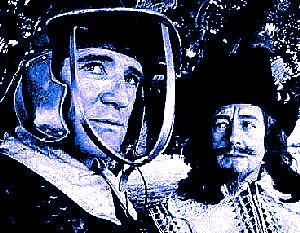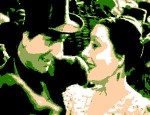Film Review
With its lavish production values and superlative cast, Ken Hughes'
account of Oliver Cromwell's part in the English Civil War and the
creation of British democracy is visually stunning, albeit rife with
historical inaccuracies. It is quite a departure from
Hughes' previous film,
Chitty Chitty Bang Bang (1968),
a return to the solid period form in which the director had previously
excelled with
The Trials of Oscar Wilde (1960).
The film's main selling point is its
gloriously overblown re-enactment of the main battles of the Civil War,
which show an almost unprecedented scale and attention to detail for a
British film of this era. Whilst their performances
generally veer towards the theatrical, Richard Harris (
This Sporting Life)
and Alec Guinness (
The Bridge on the River Kwai)
each has a commanding presence, bringing power and conviction to their
respective portrayals of Cromwell and Charles I.
The film's one weakness is its sub-standard screenplay, which falls
short in both its characterisation and depth of exposition. The
narrative lacks structure and dramatic thrust and is weakened by a welter of poorly
developed secondary characters. The dialogue is also pretty dull
and hackneyed, noticeably inferior to what you will find in other prestige
historical dramas made in Britain over the previous decade.
Despite Harris's creditable performance, the film sheds very little
light on Cromwell's psychology and motivation. Cromwell's
importance in the events depicted is slightly exaggerated and the film
paints a somewhat rosy picture of the man, not the "warts and all"
characterisation that we find in well-researched history books.
Cromwell is undeniably impressive
as a visual spectacular, but its production team were clearly far more
concerned with pageantry than politics. As an intelligent piece of drama,
the film is a let down, and it is a great shame that Ken Hughes passed
up the opportunity to deliver a serious character study in favour of
what is merely a simplistic and generally biased interpretation of
historical fact.
© James Travers 2010
The above content is owned by frenchfilms.org and must not be copied.
Film Synopsis
England, 1640. King Charles I needs to raise money so that he can
re-equip his army and see off a possible invasion from the Scots.
To do so, he has no choice but to recall Parliament for the first time
in a decade. Certain Parliamentarians, including the staunchly
Puritan landowner Oliver Cromwell, see this as an opportunity to force
the king to relinquish his authority over Parliament, laying the
foundation for a true democracy. Convinced of the Divine Right of
Kings, Charles cannot accede to Cromwell's terms, and in no time the
country is caught up in a bloody civil war. The victors of this
conflict are the Parliamentarians, who defeat the Loyalists largely
through Cromwell's creation of a New Model Army. When he
discovers that the King has sought help from the Irish and other
foreign powers to prolong the war, Cromwell has no option but to
condemn him as a traitor. But with Charles executed, who will
rule in his place?
© James Travers
The above content is owned by frenchfilms.org and must not be copied.



